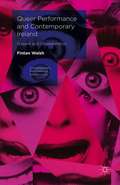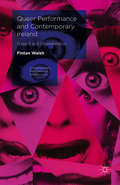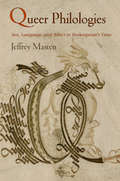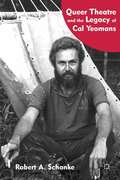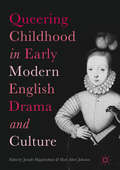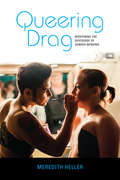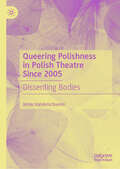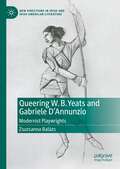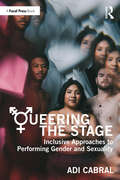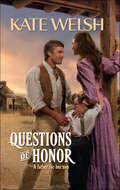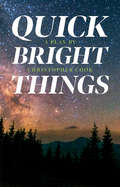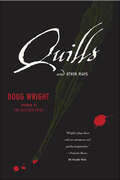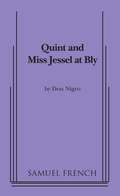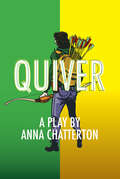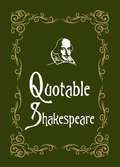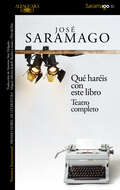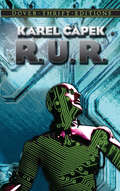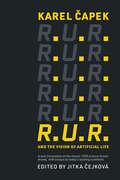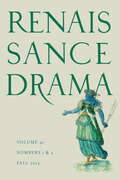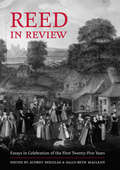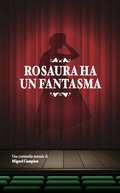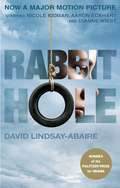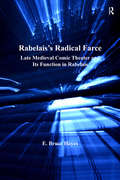- Table View
- List View
Queer Performance and Contemporary Ireland: Dissent and Disorientation (Contemporary Performance InterActions)
by Fintan WalshThis book examines the surge of queer performance produced across Ireland since the first stirrings of the Celtic Tiger in the mid-1990s, up to the passing of the Marriage Equality referendum in the Republic in 2015.
Queer Performance and Contemporary Ireland: Dissent and Disorientation (Contemporary Performance InterActions)
by Fintan WalshThis book examines the surge of queer performance produced across Ireland since the first stirrings of the Celtic Tiger in the mid-1990s, up to the passing of the Marriage Equality referendum in the Republic in 2015.
Queer Philologies: Sex, Language, and Affect in Shakespeare's Time
by Jeffrey MastenFor Jeffrey Masten, the history of sexuality and the history of language are intimately related. In Queer Philologies, he studies particular terms that illuminate the history of sexuality in Shakespeare's time and analyzes the methods we have used to study sex and gender in literary and cultural history. Building on the work of theorists and historians who have, following Foucault, investigated the importance of words like "homosexual," "sodomy," and "tribade" in a variety of cultures and historical periods, Masten argues that just as the history of sexuality requires the history of language, so too does philology, "the love of the word," require the analytical lens provided by the study of sexuality.Masten unpacks the etymology, circulation, transformation, and constitutive power of key words within the early modern discourse of sex and gender--terms such as "conversation" and "intercourse," "fundament" and "foundation," "friend" and "boy"--that described bodies, pleasures, emotions, sexual acts, even (to the extent possible in this period) sexual identities. Analyzing the continuities as well as differences between Shakespeare's language and our own, he offers up a queer lexicon in which the letter "Q" is perhaps the queerest character of all.
Queer Theatre And The Legacy Of Cal Yeomans
by Robert A. SchankeA forgotten yet award-winning playwright, Cal Yeomans was one of the founders of gay theater whose work was fueled by gay liberation and extinguished by the AIDS epidemic. Schanke's examination of his life and legacy allows a rare exploration into this pivotal moment of gay American history.
Queering Childhood in Early Modern English Drama and Culture
by Jennifer Higginbotham Mark Albert JohnstonThis volume analyzes early modern cultural representations of children and childhood through the literature and drama of Shakespeare and his contemporaries. Contributors include leading international scholars of the English Renaissance whose essays consider asexuals and sodomites, roaring girls and schoolboys, precocious princes and raucous tomboys, boy actors and female apprentices, while discussing a broad array of topics, from animal studies to performance theory, from queer time to queer fat, from teaching strategies to casting choices, and from metamorphic sex changes to rape and cannibalism. The collection interrogates the cultural and historical contingencies of childhood in an effort to expose, theorize, historicize, and explicate the spectacular queerness of early modern dramatic depictions of children.
Queering Drag: Redefining the Discourse of Gender-Bending
by Meredith HellerTheatrical gender-bending, also called drag, is a popular form of entertainment and a subject of scholarly study. However, most drag studies do not question the standard words and ideas used to convey this performance genre. Drawing on a rich body of archival and ethnographic research, Meredith Heller illuminates diverse examples of theatrical gender-bending: male impersonation in variety and vaudeville (1860–1920); the "sexless" gender-bending of El Teatro Campesino (1960–1980); queer butch acts performed by black nightclub singers, such as Stormé DeLarverie, instigator of the Stonewall riots (1910–1970); and the range of acts that compose contemporary drag king shows. Heller highlights how, in each case, standard drag discourses do not sufficiently capture the complexity of performers' intents and methods, nor do they provide a strong enough foundation for holistically evaluating the impact of this work. Queering Drag offers redefinition of the genre centralized in the performer's construction and presentation of a "queer" version of hegemonic identity, and it models a new set of tools for analyzing drag as a process of intents and methods enacted to effect specific goals. This new drag discourse not only allows for more complete and accurate descriptions of drag acts, but it also facilitates more ethical discussions about the bodies, identities, and products of drag performers.
Queering Polishness in Polish Theatre Since 2005: Dissenting Bodies
by Jonas VanderschuerenTheatre has long been an art form at the centre of public life in Poland. Whether it is the self-professed poet-prophets of the Romantic era, or the dissident theatre makers working under the strictures of state socialism, the art form has played a vital role in the development of Polish culture and politics in the context of shifting foreign occupations. This book explores the relationship between contemporary Polish theatre makers and contemporary notions of Polishness and argues that queer theory, and specifically a Polish appropriation of queer theory, can be a crucial element to better understand the politicality of the contemporary Polish theatre field. It does this by focusing on critical theatre productions which are produced at the margins of the Polish theatre field, a choice which has been made as the field is dominated by traditional drama theatres which reproduce a Polish variation on the Western canon. This makes smaller, atypical, and independent theatre productions all the more significant, as they signify a refusal to continue the traditional role of the Polish theatre field in reproducing the canon of Polish Romanticism. As such, the book argues that contemporary Polish theatre has been marked by a struggle between those building performances and state authorities that see those creations as a threat to their authority.
Queering W. B. Yeats and Gabriele D’Annunzio: Modernist Playwrights (New Directions in Irish and Irish American Literature)
by Zsuzsanna BalázsQueering W. B. Yeats and Gabriele D’Annunzio: Modernist Playwrights challenges the general resistance in scholarship and queer studies to approach Yeats and D’Annunzio through a queer lens because of their controversial affiliations with fascism and elitism, their heterosexuality and their venerated canonical status. This book provides the first fully theorised queer and comparative reading of Yeats’s and D’Annunzio’s drama. It offers the novel contention that due to their increasing involvement in queer and feminist subcultures, their plays feature feelings that are associated with queer historiography and generate ideas that began to be theorised by queer studies more than half a century after the composition of the plays. Moreover, it uncovers an alert, subversive and often coded social commentary in eight key dramatic texts by each playwright and at the same time highlights the thus far neglected commonalities between the plays and the queer historical as well as cultural contexts of these two prominent modernists.
Queering the Stage: Inclusive Approaches to Performing Gender and Sexuality
by Adi CabralQueering the Stage: Inclusive Approaches to Performing Gender and Sexuality addresses a history of stereotyping and provides inclusive approaches to navigating gender and sexuality in a way that does not reduce the broad spectrum of LGBTQ+ communities into a single monolith.Butch it up! Be more manly! Add a little swish! Queen out! These instructions make performers feel minimized, erased, and forced to fit in a binary that encourages underdeveloped portrayals of queer identities. This book will guide the reader in performance techniques for confidently embodying the masculine/ feminine, gay/ straight binaries – as concepts of chosen choreography rather than reductive prescriptions – while also providing non- binary exercises to explore and expand the use of the body, voice, heart, and mind to bring life to characters of sexual orientations and gender identities that do and do not align with the actors’ lived experiences. The reader will be presented with multiple tools for analyzing, developing, and embodying a diverse array of characters, empowering them to make their own choices when it comes to performance. While there is no “right” way to teach performance, this book will present tools rooted in trauma- informed practices that aim to prevent and undo harm in a group setting with a facilitator, or individually.This book is written for instructors of theatre performance and acting wishing to expand their curriculum to include queer concepts in their classroom, and actors working in the industry who want to improve their ability performing characters of diverse genders and sexualities.A companion website, available at www.adicabral.com/queering-the-stage, provides additional materials to support exercises given throughout the book.
Questions of Honor
by Kate WelshA stern, rock-hard man stood before Abaigeal Sullivan. No sign of the boy whose playful teases had once turned to stolen kisses and something much, much more. Why, in all the years Joshua Wheaton had been away, had he never made contact, acknowledged her astounding news-that she carried his child? Abby no longer trusted any man, but could she believe Joshua when he claimed he only ever meant to act honorably toward her? There was no doubt he wanted to get closer to her and the son that they had created together.
Quick Bright Things
by Christopher Cook“Everyone hears voices. I’m treated like I’m broken for admitting it.” Can a weekend trip to visit family ever be smooth? Nick was hoping for a quick dinner at his brother Reid’s house when he stopped by with his seventeen-year-old adopted son, Gerome, on their way to meet Gerome’s birth mother. Gerome was recently diagnosed with schizophrenia, and he wants to know more about his family history. Though Reid and his family wreak havoc with their well-meaning but misguided ideas about Gerome’s diagnosis, they manage to convince Nick and his son to stay the night, even after they find Gerome on the roof ready to demonstrate backflips. The dinner pit stop becomes a tense weekend-long event full of claims and questions as the family attempts to “un-crazy” Gerome, leading them all to a dangerous breaking point. With truth, humour, and pathos, Quick Bright Things explores a family’s struggle with understanding mental health, their ways of expressing love, and what it ultimately means to be “okay.”
Quills and Other Plays
by Doug WrightSelected early works from the Pulitzer Prize-winning playwright.Throughout his work, Doug Wright has often combined the personal, the social, and the political, in the process unearthing fundamental truths about life and art while casting an unblinking eye on the dark--and darkly funny--side of human nature. Gathered here are three of Wright's early plays, including Interrogating the Nude, a tongue-in-cheek reimagining of the uproar surrounding the debut of Marcel Duchamp's work in America; Watbanaland, a satiric dissection of yuppie desire and a haunting look at family and faith; and the Obie Award-winning Quills, which explores the boundaries of artistic expression and the dangers of censorship as they played out in the Marquis de Sade's final days at Charenton Asylum.
Quint and Miss Jessel at Bly
by Don NigroDramaCharacters: 2 male, 1 female. Unit Set. Peter Quint is sent by his lifelong employer, the Master of Bly, to be the servant in charge of a remote English country house where Miss Jessel has just arrived to be governess to the orphaned children of the master's brother. The ultimately deadly love triangle that results forms a darkly funny and erotic Gothic love story. These are the lovers who haunt Henry James's The Turn of the Screw. Quint is brilliant, sardonic and angry, a man of great abilities trapped by birth into a subservient role he hates. Miss Jessel is beautiful, headstrong, troubled, and deeply infatuated with the master. As Quint and Miss Jessel's affair develops, the rivalry between servant and master builds to a frightening and haunting climax.
Quiver
by Anna Chatterton“She doesn’t care about me; she doesn’t even want to see me; she just pretends she does.” Shy, fourteen-year-old Maddie wasn’t expecting to have to worry about taking care of herself just yet. Her sixteen-year-old party-girl sister Bea has scandalously moved in with their mom’s ex-boyfriend, and in turn their brassy mother Sheila has run straight to the comfort of another lover. Maddie is finding that an empty apartment is quiet and lonely, even though her time is normally spent reading comics in her closet. Feeling abandoned and vulnerable, she turns to her favourite superhero, Arrowette. Armed with a backpack filled with a bow and arrows, she embarks on a radical plan to join the army, where she thinks she will find a new family she can count on. Meanwhile, Bea is second-guessing the whole dating an older man thing, and Sheila defends her unorthodox sexual candour, entertaining the ideals of freedom. When Bea and Sheila decide to come home for Maddie’s birthday, they’re faced with the pointed arrow of Maddie’s newfound power and the startling reality of the kind of family they’ve become.
Quotable Shakespeare (Quotable Ser.)
by Max MorrisThis entertaining collection gathers together William Shakespeare's wisest and wittiest quotations. Quotable Shakespeare proves that brevity is the soul of wit and is sure to delight all lovers of the Bard's uniquely perceptive and influential works.
Quotable Shakespeare (Quotable Ser.)
by Max MorrisThis entertaining collection gathers together William Shakespeare's wisest and wittiest quotations. Quotable Shakespeare proves that brevity is the soul of wit and is sure to delight all lovers of the Bard's uniquely perceptive and influential works.
Qué haréis con este libro
by José SaramagoToda la obra dramática del Premio Nobel de Literatura portugués reunida en un solo volumen por primera vez en español: una perfecta combinación de ideas plenamente vigentes y maestría literaria. «La memoria es el dramaturgo que todos tenemos dentro. Pone en escena e inventa un disfraz para cada ser vinculado con nosotros. La distancia entre lo que fue una persona y lo que se recuerda de ella es literatura.»José Saramago José Saramago se llamaba a sí mismo «el dramaturgo involuntario» porque siempre sintió que su contribución a ese género venía marcada por circunstancias azarosas. Pero incluso así, su genio creativo dio luz a las cinco obras teatrales que se reúnen ahora en este volumen: La noche (1979), ¿Qué haré con este libro? (1980), La segunda vida de Francisco de Asís (1987), In Nomine Dei (1993) y Don Giovanni o El disoluto absuelto (2005). Salvo La noche e In Nomine Dei, se publican por primera vez en castellano. Con la hondura propia de toda su obra -aunque revestida de una aparente simplicidad-, brilla en estas piezas magistrales la ironía del autor y la agudeza de sus reflexiones. Los grandes héroes dejan paso a los hombres y mujeres sencillos que, desde la honestidad y la firmeza de sus convicciones, luchan por la libertad, la justicia y un futuro mejor. Ambientadas en lugares y épocas distintos que van desde el Portugal del triunfo de la revolución de los Claveles o el renacentista del poeta Camões, a la Alemania de la reforma luterana, la Italia de don Giovanni o la intemporalidad deslocalizada de una empresa en crecimiento, en ellas las grandes cuestiones que caracterizan el pensamiento del autor están expuestas sin enjuiciamientos ni sentencias. Todas ellas son parte de un diálogo que Saramago mantiene para siempre, desde cada una de las páginas que escribió, con sus lectores.
Qué haréis con este libro: Teatro completo
by José SaramagoToda la obra dramática del Premio Nobel de Literatura portugués reunida en un solo volumen por primera vez en español: una perfecta combinación de ideas plenamente vigentes y maestría literaria. «La memoria es el dramaturgo que todos tenemos dentro. Pone en escena e inventa un disfraz para cada ser vinculado con nosotros. La distancia entre lo que fue una persona y lo que se recuerda de ella es literatura.»José Saramago José Saramago se llamaba a sí mismo «el dramaturgo involuntario» porque siempre sintió que su contribución a ese género venía marcada por circunstancias azarosas. Pero incluso así, su genio creativo dio luz a las cinco obras teatrales que se reúnen ahora en este volumen: La noche (1979), ¿Qué haré con este libro? (1980), La segunda vida de Francisco de Asís (1987), In Nomine Dei (1993) y Don Giovanni o El disoluto absuelto (2005). Salvo La noche e In Nomine Dei, se publican por primera vez en castellano. Con la hondura propia de toda su obra -aunque revestida de una aparente simplicidad-, brilla en estas piezas magistrales la ironía del autor y la agudeza de sus reflexiones. Los grandes héroes dejan paso a los hombres y mujeres sencillos que, desde la honestidad y la firmeza de sus convicciones, luchan por la libertad, la justicia y un futuro mejor. Ambientadas en lugares y épocas distintos que van desde el Portugal del triunfo de la revolución de los Claveles o el renacentista del poeta Camões, a la Alemania de la reforma luterana, la Italia de don Giovanni o la intemporalidad deslocalizada de una empresa en crecimiento, en ellas las grandes cuestiones que caracterizan el pensamiento del autor están expuestas sin enjuiciamientos ni sentencias. Todas ellas son parte de un diálogo que Saramago mantiene para siempre, desde cada una de las páginas que escribió, con suslectores.
R.U.R.
by Karel CapekBased on a pair of comic dramas from ancient Rome, The Comedy of Errors presents a spectacle of pure farce in the spirit of utmost fun and -- as the title suggests -- hilarious confusion. Two sets of identical twins provide the basis for ongoing incidents of mistaken identity, within a lively plot of quarrels, arrests, and a grand courtroom denouement. One of Shakespeare's earliest dramatic efforts, the play abounds in his trademark conceits, puns, and other forms of fanciful wordplay. It also foreshadows his later and greater comedies, offering students and scholars a valuable key to the playwright's development.
R.U.R. and the Vision of Artificial Life
by Karel CapekA new translation of Karel Čapek&’s play R.U.R.—which famously coined the term &“robot&”—and a collection of essays reflecting on the play&’s legacy from scientists and scholars who work in artificial life and robotics.Karel Čapek's &“R.U.R.&” and the Vision of Artificial Life offers a new, highly faithful translation by Štěpán Šimek of Czech novelist, playwright, and critic Karel Čapek&’s play R.U.R.: Rossum&’s Universal Robots, as well as twenty essays from contemporary writers on the 1920 play. R.U.R. is perhaps best known for first coining the term &“robot&” (in Czech, robota means serfdom or arduous drudgery). The twenty essays in this new English edition, beautifully edited by Jitka Čejková, are selected from Robot 100, an edited collection in Czech with perspectives from 100 contemporary voices that was published in 2020 to celebrate the hundredth anniversary of the play.Čapek&’s robots were autonomous beings, but biological, not mechanical, made of chemically synthesized soft matter resembling living tissue, like the synthetic humans in Blade Runner, Westworld, or Ex Machina. The contributors to the collection—scientists and other scholars—explore the legacy of the play and its connections to the current state of research in artificial life, or ALife. Throughout the book, it is impossible to ignore Čapek&’s prescience, as his century-old science fiction play raises contemporary questions with respect to robotics, synthetic biology, technology, artificial life, and artificial intelligence, anticipating many of the formidable challenges we face today.ContributorsJitka Čejková, Miguel Aguilera, Iñigo R. Arandia, Josh Bongard, Julyan Cartwright, Seth Bullock, Dominique Chen, Gusz Eiben, Tom Froese, Carlos Gershenson, Inman Harvey, Jana Horáková, Takashi Ikegami, Sina Khajehabdollahi, George Musser, Geoff Nitschke, Julie Nováková, Antoine Pasquali, Hemma Philamore, Lana Sinapayen, Hiroki Sayama, Nathaniel Virgo, Olaf Witkowski
RD vol 41 num 12
by The University of Chicago PressThis is volume 41 issue 12 of Renaissance Drama. Renaissance Drama explores the rich variety of theatrical and performance traditions and practices in early modern Europe and intersecting cultures. The sole scholarly journal devoted to the full expanse of Renaissance theatre and performance, the journal publishes articles that extend the scope of our understanding of early modern playing, theatre history, and dramatic texts and interpretation, encouraging innovative theoretical and methodological approaches to these traditions, examining familiar works, and revisiting well-known texts from fresh perspectives.
REED in Review
by Audrey Douglas Sally-Beth MacleanIn 2002, the Records of Early English Drama (REED) project marked its twenty-fifth anniversary with a special series of sessions at the International Medieval Congress at Leeds University. The REED sessions were designed to allow critical reflection on the past, present, and future of the project as it entered the twenty-first century. Thirteen essays amplifying the content of selected conference papers, and a fourteenth submitted at the editors' invitation, make up REED in Review.Contributors to the collection describe the conception and early years of REED, assess the project's impact on recent and current scholarship, and anticipate or propose stimulating new directions for future research. Individual essays address a wide variety of subjects, from the impact of REED research on Shakespeare textual editing, Robin Hood, patronage, and Elizabethan theatre studies, to a thought provoking redefinition of 'drama,' details of recent ground-breaking research in Scottish records, and the broadening possibilities for editorial and research relationships with information technology. The editors' introduction and a select bibliography, with commentary and a list of REED-related publications by editors and scholars from a variety of disciplines, make up the remainder of this landmark volume.
ROSAURA HA UN FANTASMA
by Miguel Campion Francesca Chiesurin"Katarsis" è una compagnia teatrale amatoriale (per definirla in maniera benevola) operativa in Spagna, squattrinata e per questo sempre alla ricerca di sovvenzioni per sopravvivere. La direttrice è Beatriz il cui sogno sarebbe allestire delle pieces artistiche sovversive e all' avanguardia ma ripiega poi sempre nelle opere classiche del Secolo d'oro spagnolo per il circolo degli anziani del suo quartiere. Quando Rosaura appare ai ragazzi della compagnia , essi credono che finalmente riusciranno a dare una svolta alla loro poco lusinghiera carriera artisitca. Rosaura gli offre un lauto assegno per mettere in scena "La vita è Santa" l'opera che scrisse la madre ora defunta di Rosaura che non riposerà in pace finchè il suo libretto non verrà rappresentato . Nonostante il testo scritto dalla donna si riveli un pasticcio, uno scimmiottamento improbabile delle opere del Secolo d'Oro, i ragazzi cercano di impegnarsi nell 'allestimento della rappresentazione. Non prevedendo ciò che succederà in seguito: Rosaura esige di recitare lei stessa. E non è che reciti tanto peggio del resto dei componenti del gruppo, che già è tutto dire, ma ciò che è più grave è che non si presenta alle prove mai sola. Litigi, ambizioni, corna, scambi di fidanzati, pugnalate alle spalle, spropositi, deliri, e apparizioni spettrali si succedono mentre assistiamo all'inevitabile decadenza e fine di una compagnia teatrale mediocre.
Rabbit Hole (movie tie-in)
by David Lindsay-AbaireMovie tie-in edition of the film from Lions Gate starring Nicole Kidman, Aaron Eckhart and Dianne Wiest. Life for a happy couple is turned upside down after their young son dies in an accident.
Rabelais's Radical Farce: Late Medieval Comic Theater and Its Function in Rabelais
by E. Bruce HayesIn the first extended investigation of the importance of dramatic farce in Rabelais studies, Bruce Hayes makes an important contribution to the understanding of the theater of farce and its literary possibilities. By tracing the development of farce in late medieval and Renaissance comedic theater in comparison to the evolution of farce in Rabelais's work, Hayes distinguishes Rabelais's use of the device from traditional farce. While traditional farce is primarily conservative in its aims, with an emphasis on maintaining the status quo, Rabelais puts farce to radical new uses, making it subversive in his own work. Bruce Hayes examines the use of farce in Pantagruel, Gargantua, and the Tiers and Quart livres, showing how Rabelais recast farce in a humanist context, making it a vehicle for attacking the status quo and posing alternatives to contemporary legal, educational, and theological systems. Rabelais's Radical Farce illustrates the rich possibilities of a genre often considered simplistic and unsophisticated, disclosing how Rabelais in fact introduced both a radical reformulation of farce, and a new form of humanist satire.
